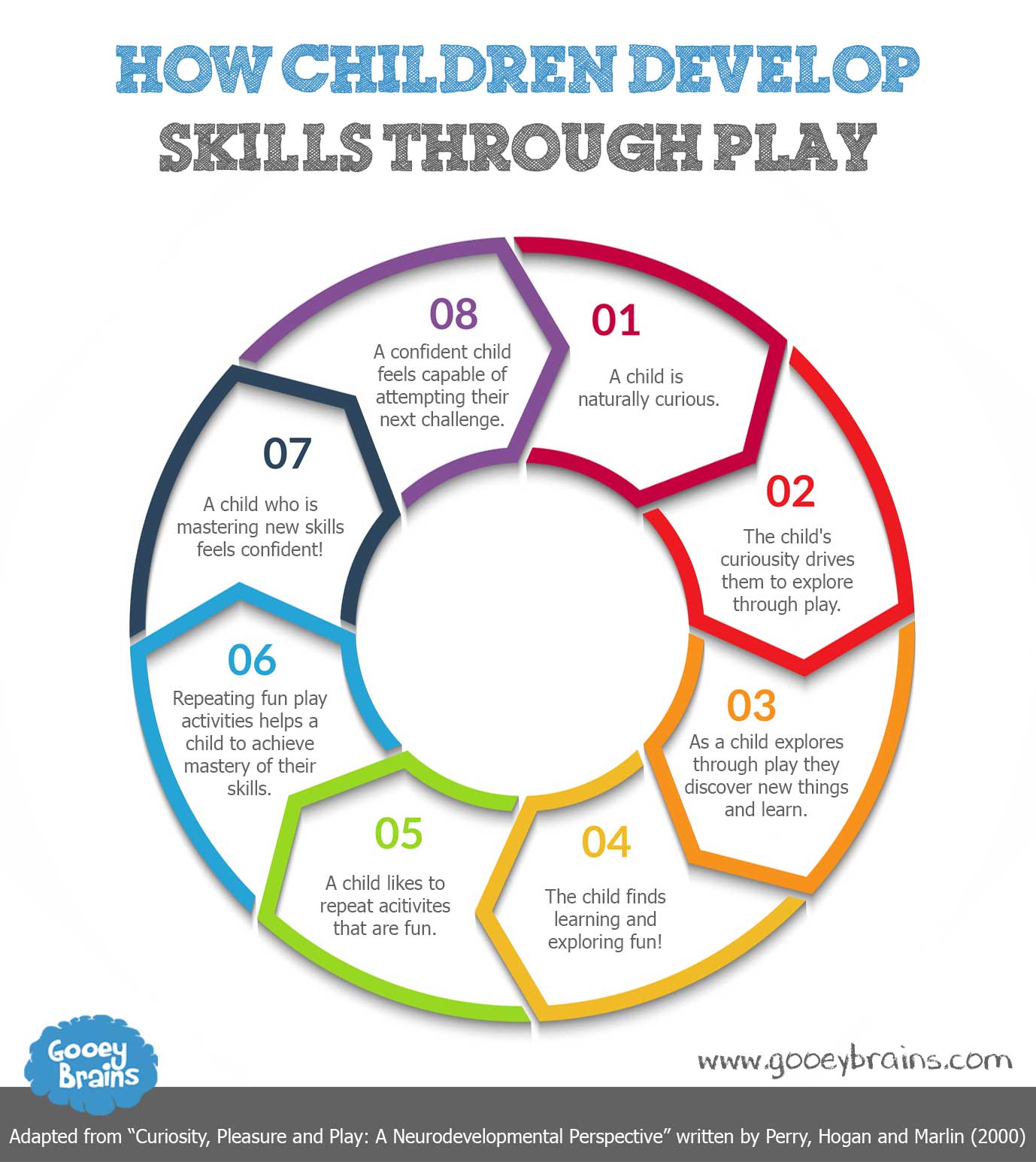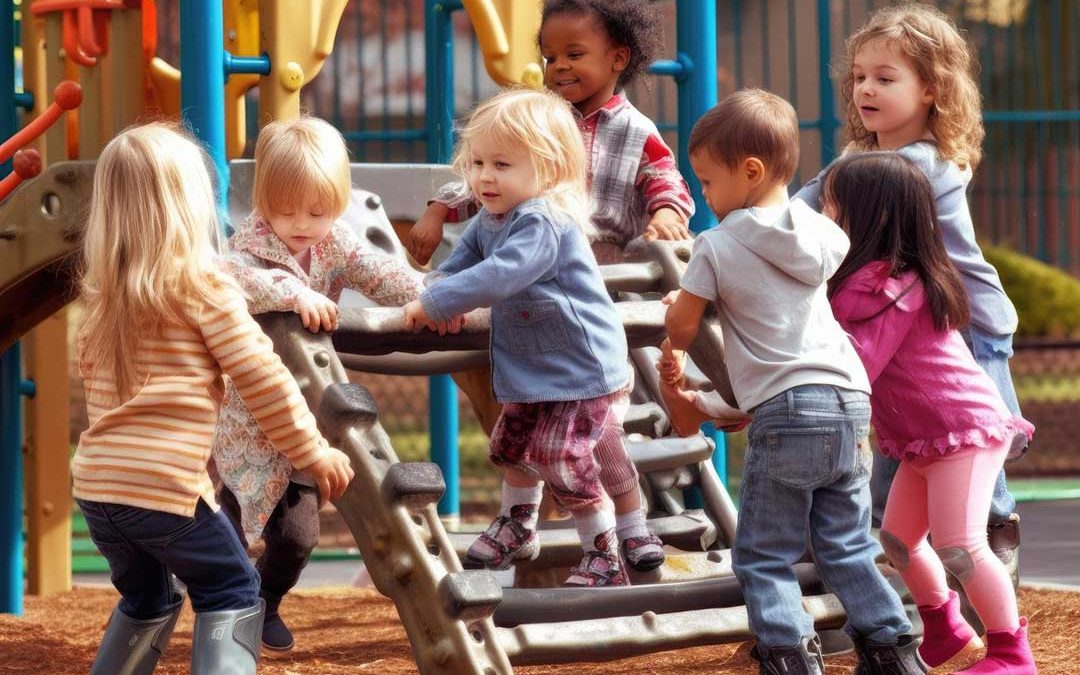Food isn’t the only thing that fuels brain development. Children also develop skills through playing! Perhaps when you hear the word “play,” what comes to mind is a game of tag or baseball, but play occurs as early as birth. Simple games like peek-a-boo and jack-in-the box are great games to play with infants as they offer the brain repeat experiences.
When children repeat experiences, the connections between brain cells are strengthened. Repeated activities also give children opportunities to practice their skills. What the child learns from a repeated activity actually changes in meaning as the child grows and develops. For example, a child may watch a jack-in-the-box pop up time and again. Initially, she may learn cause and effect, and begin to anticipate the clown popping up. As she grows and her motor skills develop, this activity holds new meaning as the child attempts to use her new found motor skills to reach for and turn the windup key herself. Offering experiences with a range of related concepts is a good strategy for strengthening brain connections and promoting learning.

Repetition is not always helpful, though. For example, if a caregiver always or usually ignores a child’s cries, the “lesson” will be that the child is not important and cannot trust adults. This is NOT a positive, responsive interaction as we learned about earlier in our blog series. For example, reviewing math flash cards with infants does not strengthen the connections in the brain that lead to mathematical skills. Singing the alphabet song to babies does not lead to identification of letters. Furthermore, teaching a concept that is too advanced for your child, such as multiplication to a five-year old, may lead to frustration and quitting. So, keep it positive and age appropriate!
When children play, they look, listen, touch, smell, and taste. They are moving their bodies and exploring the toys, people, places, and objects in their environment. They learn through their senses and hands on experiences, which enable them to perform necessary tasks and problem-solving in the future. Just as gross and fine motor skills develop sequentially, the areas of the brain develop for each child at differing times. Through this sensory play and, later, pretend play, the brain builds new connections and strengthens existing connections. These connections become the learning patterns of physical, emotional, cognitive, and social development. There is no need to rush your child’s learning and development. They all learn at their own pace. The truth is that the more engaged a child is —playing and enjoying himself– the more he is learning.
What Babies Learn While Playing
Some adults who watch children playing believe they are not doing anything very important. But if you watch carefully, you may notice that babies who are playing are actually practicing some complex and important skills. All of these experiences help strengthen connections in the brain:
- Exploring new objects. During play, children use all of their senses to explore things in the world around them. They may hold objects close to their eyes, drop them to hear the sound they make, or even place them in their mouths.
- Testing how things work. When babies sit in a high chair and drop things on the floor, they learn about cause and effect. A rattle bounces and makes a noise; a glass shatters; and a handful of cottage cheese spatters. By experimenting, children begin to figure out what happens next and how different objects work.
- Practicing and expanding skills. Children may try something new during play, and then repeat it over and over again until they perfect it. Children may also “accidentally” do something new. For example, a baby playing with crayons may accidentally press hard enough to leave a mark on the paper. He might look at that mark, decide it’s interesting, and try to repeat the motion to make another mark. What began as an accidental discovery begins a process of building connections in the brain, leading to further discoveries.
- Making decisions. Play is a child-directed activity. Children decide whether they want to play, what they want to do, how they will do what they choose, whether to play with others or alone, and when to switch to another activity. Making these types of decisions gives children confidence and prepares them to make bigger decisions as they get older.
- Trying out new roles. Pretend play gives children chances to test out the roles of different people around them. As they explore being a parent or a teacher or a firefighter, their understanding of the world expands, and they begin to recognize that different people see things differently.
- Coping with stress. Pretend play can be an important way for children to make sense of stressful situations. Through play, they can gain control over the monsters that frighten them at night or better deal with the changes that come with moving to a new house.
What Can You Do?
Even though play is a child-directed activity, parents and caregivers can help support and encourage young children’s play. Here are some simple ways to help build brain connections through play:
- Provide new experiences. Take babies to interesting places. Give them new materials to explore. Remember that new experiences don’t need to be expensive. A simple trip to the library or park, or a pot and wooden spoon, can provide new ideas for play.
- Give time to try new ideas and practice skills. Complex play requires time. Children who are hurried from one activity to another do not have time to focus, experiment, and find new solutions. Plan blocks of playtime during the day, and allow plenty of time for children to do something that interests them. If children are engrossed in a play activity when playtime is over, consider giving them some additional time to keep playing. Remember how essential play is to brain development.
- Allow space to explore. Instead of teaching children how to use a new object, encourage them to test it out on their own. Wait until your child seeks your help. Adults who hover or take over when children are playing mean well, but they may actually discourage children from exploring on their own.
- Support their play. Adults can encourage and expand children’s play by modeling other things to do with a toy or material, by making suggestions, by describing what you are doing with the object, or by asking “what if” questions, like “What would happen if you mixed the red and blue paint?”
- Allow quiet time to consolidate learning. Children’s brains, like adults’ brains, need time to make sense of new things they learn. Instead of racing from one activity to the next, give children a little bit of unstructured quiet time between activities to relax, take a deep breath, and process what they have just learned.
Is Your Child Ready to Start Their Preschool Education?
We hope you’ve been able to gather some good ideas to help your child learn to count! Early childhood education is super important. If you think about it, you use skills everyday as an adult that you first learned during those early years where you were first learning basics like counting. At Rising Stride Child Care Centers, we will help your child learn to count! Our preschool programs are play-based and academically focused. Visit our Contact Us page to fill out our form or give us a call. We’ll be happy to answer any questions you may have!

